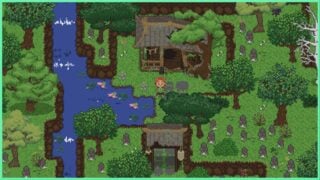Get yourself nice and relaxed, grab a (spirit)tea and relax as I tell you all about Spirittea. The game starts with you jumping right into a bus ride to your new shack. You tell the driver your stop, your birthday, and then promptly get dressed in front of him before taking your seat. Very intimate. The personalisation options are thin, but inclusive, which is ultimately more important. Though this isn’t important for a review, I named my town Satosugu. Just had to mention it.
This game’s main inspirations, Stardew Valley and Spirited Away, are combined into a pleasant little experience. I was a huge fan of the game’s sound design with charming birdsong present throughout. My appreciation for the sound design extends to the map view too, which can only be described as pleasantly funky. The bouncing house animations and little song that pairs was a feature that immediately made me grin, but perhaps I am a little to easy to please…
What’s The Tea?
The actual gameplay is simple and straightforward. Everything gets explained to you as you need it as not to overwhelm you. Most of the gameplay mechanics get explained when you first open your bathhouse (since this is, of course, the highlight of the game).
Make sure you don’t speedrun the dialogue either – as this not only is this where most of your gameplay mechanics are fed to you, but the dialogue is also charming and hilarious. You get to respond to the NPCs sometimes as well, and the default option isn’t always the kinder one.
You meet a range of charming characters throughout the game. From the spirits you guide to fellow humankind, there are so many faces to greet and chat with. Your task as the new bathhouse employee is to uncover lost spirits who are up to no good around your town, and guide them to the bathhouseto keep the spirit tree thriving. The “Tea” part of the title comes from the special tea you brew which allows you to see the ghostly fiends.
I can’t avoid mentioning the scenery too. For such a simple-styled 2D game, Spirittea has some gorgeous landscapes. It almost looks amusing seeing such a puny, simple avatar dash around such detailed map art. This extends into the character chats too, where every NPC has their own unique pixel art bust shot to accompany their conversation. It’s here the artists who worked on this game really shine since they turned the simple avatars into almost semi-realistic pixel shots with unique face structures and poses.
Enough of my gushing, look at this scenery shot where even a run-down shack is pleasing to the eyes:
Final Thoughts For My Spirittea Review
Ultimately my time with Spirittea was wonderful. I thought I’d be sick of cozy pixel games by now, but this games proves that to be completely untrue. Spirittea has so much to offer than just being a spirit bathhouse tycoon sim. Without spoiling the story, you get to interact with the diverse NPCs and build relations – much like in Stardew Valley. You can celebrate events with the townsfolk like birthdays. As well as complete little side-quests for them when you’re not tending to your bathhouse.
On a final note. If you’re after a new game that doesn’t put pressure on you to commit to one task then Spirittea is a good fit for you as well. Fans of Stardew Valley and/or Spirited Away are almost guaranteed to love this pleasant pixel adventure. As someone who is a huge Ghibli fan who struggled to get into Stardew Valley this game gives me a flavour of what I felt I was missing out there.
Overall Spirittea is imbued with so much charm, and it’s all wove together to create a fascinating and whimsical experience. Plus, with a character as sassy and hilarious as Wonyan to guide me, all the tasks he bestows are always delivered alongside amusing dialogue. I’m a dog person at heart, but Wonyan is my honourary cat.
Hopefully, my Spirittea review has convinced you to check out this awesome little game which you can find on both Steam and the Nintendo Store.
The post Spirittea Review – What’s The tea? appeared first on Gamezebo.

No responses yet